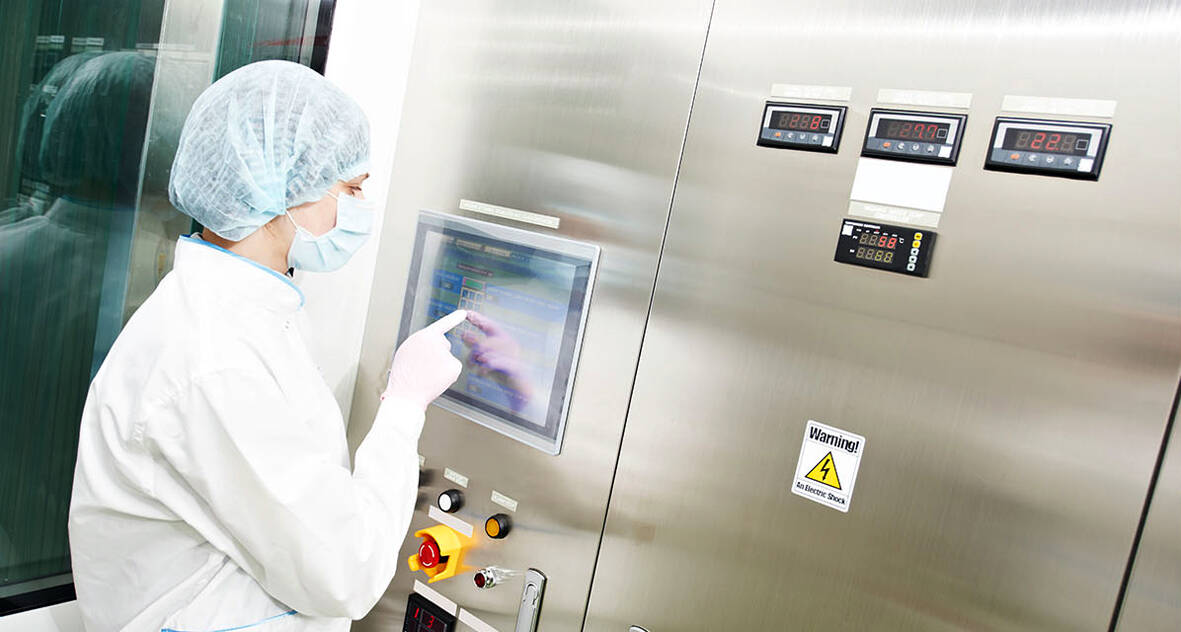Cica-Huntek Chemical Technology Taiwan Co (矽科宏晟), a major chemical dispense system supplier to Taiwan Semiconductor Manufacturing Co (TSMC, 台積電), said in a regulatory filing yesterday that it is to inject US$123 million capital into its US subsidiary for long-term investment purposes.
The company specializes in installing chemical dispense systems for advanced chip manufacturing fabs, including 3-nanometer and 5-nanometer fabs, as well as advanced chip-on-wafer-on-substrate packaging fabs. It established the US subsidiary, Cica-Huntek Chemical Technology USA Corp, in April 2021.
The company’s board of directors approved the latest investment yesterday, and it came three months after TSMC said it would double down on its US investment of US$165 billion.

Photo courtesy of Cica-Huntek Chemical Technology Taiwan Co
Cica-Huntek Chemical president Alex Ko (柯燦塗) in May said that the firm was asked to deploy its teams in the US, as its key customer plans to build multiple fabs there.
The company operates an office in Kumamoto, Japan, and a Singaporean office to provide on-site services, as well as two Chinese sites. It is evaluating the feasibility of setting up a European unit in Germany or the Czech Republic, it said.
The company counts TSMC, Micron Technology Inc and Vanguard International Semiconductor Corp (世界先進) among its customers.

SETBACK: Apple’s India iPhone push has been disrupted after Foxconn recalled hundreds of Chinese engineers, amid Beijing’s attempts to curb tech transfers Apple Inc assembly partner Hon Hai Precision Industry Co (鴻海精密), also known internationally as Foxconn Technology Group (富士康科技集團), has recalled about 300 Chinese engineers from a factory in India, the latest setback for the iPhone maker’s push to rapidly expand in the country. The extraction of Chinese workers from the factory of Yuzhan Technology (India) Private Ltd, a Hon Hai component unit, in southern Tamil Nadu state, is the second such move in a few months. The company has started flying in Taiwanese engineers to replace staff leaving, people familiar with the matter said, asking not to be named, as the

The prices of gasoline and diesel at domestic fuel stations are to rise NT$0.1 and NT$0.4 per liter this week respectively, after international crude oil prices rose last week, CPC Corp, Taiwan (台灣中油) and Formosa Petrochemical Corp (台塑石化) announced yesterday. Effective today, gasoline prices at CPC and Formosa stations are to rise to NT$27.3, NT$28.8 and NT$30.8 per liter for 92, 95 and 98-octane unleaded gasoline respectively, the companies said in separate statements. The price of premium diesel is to rise to NT$26.2 per liter at CPC stations and NT$26 at Formosa pumps, they said. The announcements came after international crude oil prices

SinoPac Financial Holdings Co (永豐金控) is weighing whether to add a life insurance business to its portfolio, but would tread cautiously after completing three acquisitions in quick succession, president Stanley Chu (朱士廷) said yesterday. “We are carefully considering whether life insurance should play a role in SinoPac’s business map,” Chu told reporters ahead of an earnings conference. “Our priority is to ensure the success of the deals we have already made, even though we are tracking some possible targets.” Local media have reported that Mercuries Life Insurance Co (三商美邦人壽), which is seeking buyers amid financial strains, has invited three financial

CAUTION: Right now, artificial intelligence runs on faith, not productivity and eventually, the risk of a bubble will emerge,’ TIER economist Gordon Sun said Taiwanese manufacturers turned more optimistic last month, ending a five-month streak of declining sentiment as concerns over US tariffs, currency volatility and China’s overcapacity began to ease, the Taiwan Institute of Economic Research (TIER) said yesterday. The manufacturing business confidence index rose 1.17 points from June to 86.8, its first rebound since February. TIER economist Gordon Sun (孫明德) attributed the uptick to fading trade uncertainties, a steadier New Taiwan dollar and reduced competitive pressure from Chinese producers. Taiwan’s semiconductor industry is unlikely to face significant damage from Washington’s ongoing probe into semiconductors, given the US’ reliance on Taiwanese chips to power artificial